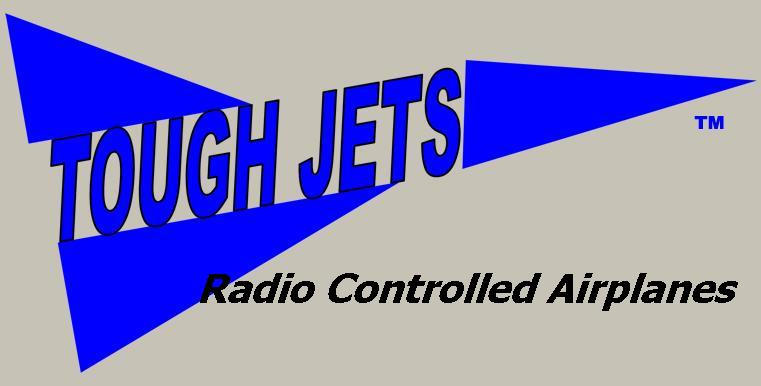


Table of Contents
Tip: Best Electric Ducted Fan to use
Tip: Customizing Your Tough Jet
Tip: Best 4 Cell Battery for EDF version
Tip: Flight Control Deflection
Tip: Best 3 Cell Battery for Prop version
Tip: Best Servo Y Harness to use
Tip: Neat and Easy ESC Mounting
Tip: Making Your Tough Jet Tougher
Tip: Make your T-14 quieter
Tip: Photo's show servo placement and wing diagram for T14 upgrade
Problem: Very short flight duration and/or low power
Problem: Plane will not loop or pitches nose down under full power.
Tip: Center of Gravity.
Best Electric Ducted Fan to use
Tip: We recommend the FMS 70mm 12-blade EDF for our Ducted Fan versions. This EDF produces 3.5 lbs of thrust with a 4cell battery. See pictures below. It's available on our website.
If you prefer another brand of EDF, make sure that it produces at least 3 lbs of thrust.
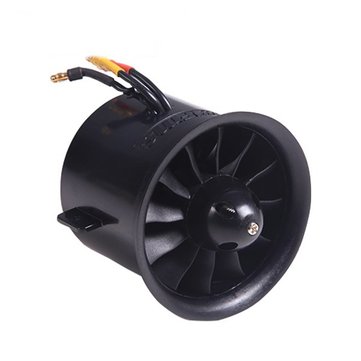
Go back to table of contents.
Customizing Your Tough Jet
Tip: It's very easy to customize your Tough Jet using Monokote Trimsheet TM. You can cut this adhesive backed sheet into any shape you wish and adhere to the wing and tail sections of your plane to produce stripes or camouflage patterns.
It is sold in various colors as you can see in the two photos below. The white T-15 has no paint at all. All of the colors and patterns that you see on this model are produced with Monokote Trimsheet and decals. As for the gray T-15, the foam has been painted with Krylon smoke gray spray paint and the gray Coroplast TM has no paint on it. The camo patterns are produced with the Monokote Trim sheet as well.
As you can see it is very easy to produce a jaw-dropping paint scheme with very little or no paint at all.
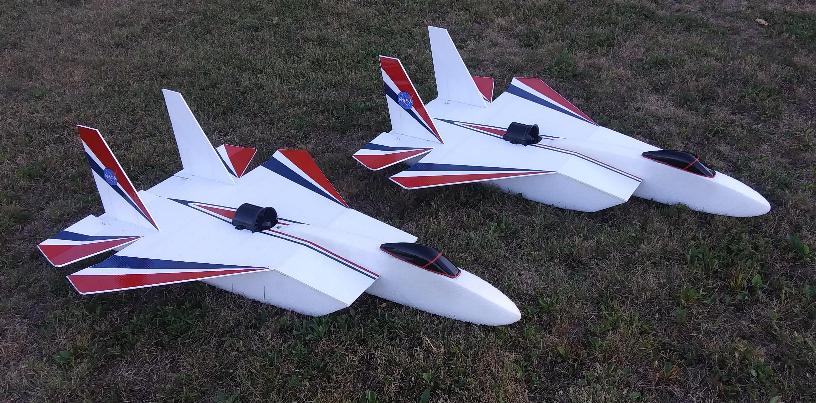
Go back to table of contents.
Best 4 Cell Battery for EDF version
Tip: We recommend GFORCE ELITE SERIES 40C 2600MAH 4S 14.8V LIPO or equivalent. See pictures below.
We found this battery to produce the best flight times.
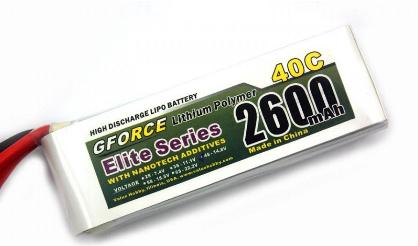
Go back to table of contents.
Flight Control Deflection
Tip: This photo and the video below shows the required upward deflection of the elevons for level flight. This is how the trailing edge of your plane's wing should look when your flight controls are neutral and the plane is flying straight and level.
You'll find the recommended flight control throws for the T-14V and T-15 kits in the instruction manuals.
Go back to table of contents.
Best 3 Cell Battery for Prop version
Tip: We recommend 11.1v 2200mah 50C EZ Flite Pro Lipo Battery or equivalent. See pictures below.
We found this battery to produce the best flight times.
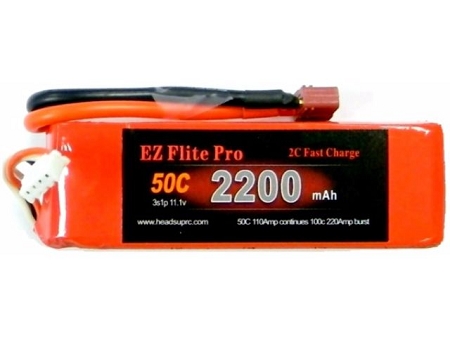
Go back to table of contents.
Best Y Harness to use
Tip: I have found the 6 inch Servo "Y" Harness Block Connector to be best for connecting your elevon servos. See pictures below.
You'll find this makes for a neat, tangle free connection.
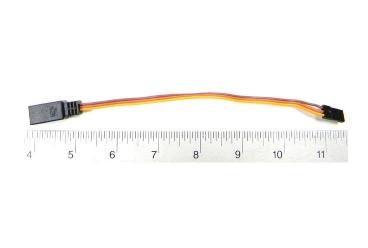
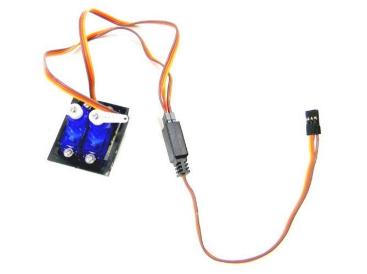
Go back to table of contents.
Neat and Easy ESC Mounting
Tip: You can use small pieces of coroplast epoxied to the underside of the wing to attach your electronic speed control and or receiver. The coroplast can then be used to hold a zip tie as shown in the picture below.
You'll find this makes a nice, neat base for attaching your elctronics.
Go back to table of contents.
Making Your Tough Jet Tougher
Tip: In the unlikely event that you crash your Tough Jet, (I don't know why I'm even talking about this; that never happens to any of us), you may find that the fuselage will break just forward of the wing in behind the battery box. This may be the only weak point on the plane. A few satisfied Tough Jet owners have reinforced this area with a small strip of carbon fiber approximately 1/16 x 1/8 x 10" long.
They make a single cut with an X-acto knife on each side of the fuselage just below the battery box. Then insert the carbon fiber strip, coated with a thin layer of epoxy, into the slit. The resulting modification is almost invisible. See photos below.
You'll find this modification very easy to do and very effective in toughening your Tough Jet.
Go back to table of contents.
A Quieter T-14
Tip: The T-14 is a loud noisy electric, (some of you like that). This noise is caused mostly by the tip of the prop passing through the prop slot in the wing.
You can reduce this noise by cutting the prop slot a little wider, (to a max of 7/8th of an inch) and/or adding a 3 bladed Master Airscrew 8X6 Standard Nitro prop (not a pusher or electric). The prop change is the more dramatic change.
These changes will make your T-14 sound more like an electric ducted fan. Less Bark same Bite.
Go back to table of contents.
Photos show servo placement and wing diagram for T14 upgrade
Tip: Photos show servo placement and wing diagram for T14 upgrade
Tip: Upgrade: You can upgrade your original T-14 to the T-14V version by adding two additional servos, Y connector, and control linkage, and cutting the new flight control surfaces shown on wing diagram.
These photos show the location for the T-14V servos, they are placed on the inboard side of the nacelles opposite and above the original servos as seen on page 15 and 16 of the T-14 manual. Servos are connected with Y cords to original elevon servos.
Center of gravity is still maintained at 11 1/4 to 11 1/2 from the leading edge of wing add nose weight if necessary.
T-14V Thrust vectoring flight control surface throws
Center - Elevon, FULL UP: about 1 inch up Center - Elevon, NEUTRAL: about 3/32 up Center - Elevon, DOWN about 1/2 inch down Original Elevon, throws stay the same see page 16, 19 and 21 of T-14 manual.
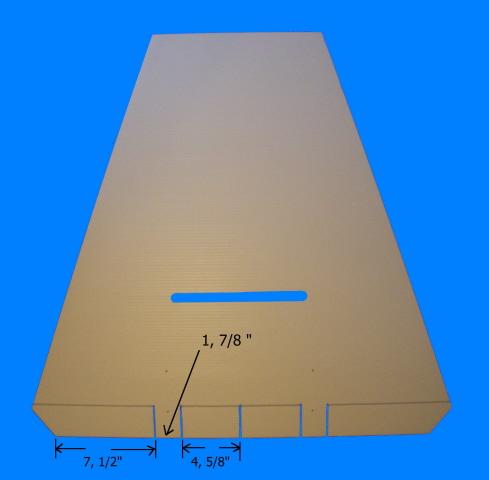
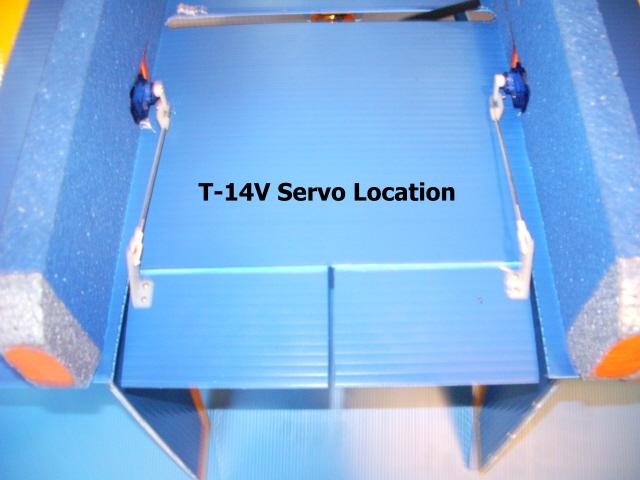
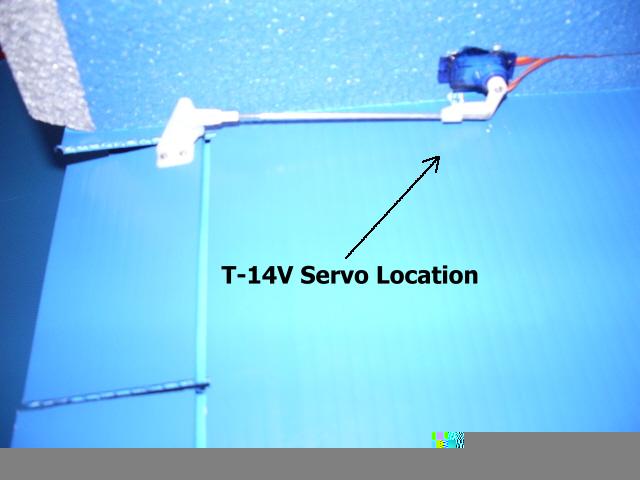
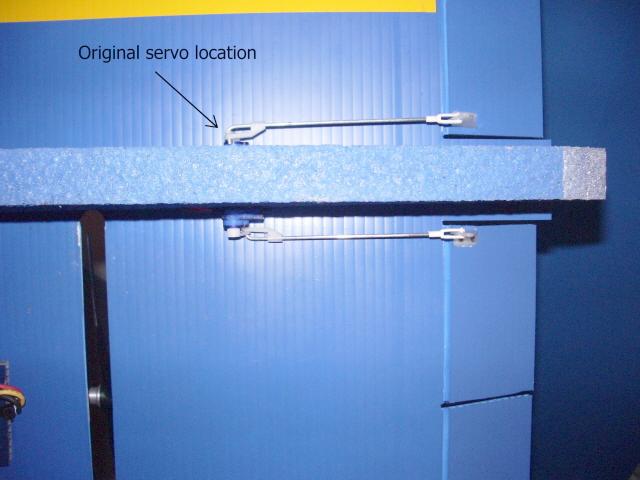
Go back to table of contents.
Very short flight duration and/or low power
Problem: Very short flight duration and or low power.
Solutions: Check battery for full charge. Check prop is installed correctly, see page 11,12 and 21 of instruction manual.
Go back to table of contents.
Plane will not loop or pitches nose down under full power.
Problem: Plane will not loop or pitches nose down under full power.
Solutions: Check areas noted in photos below are correct, (Note the T-14 parts are very flexible some very slight distortion is normal look for excessive curves)
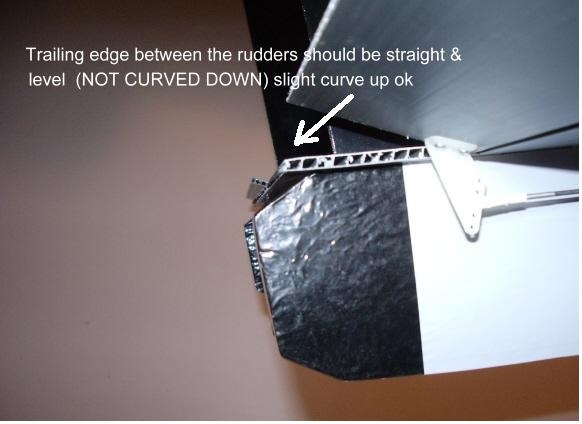
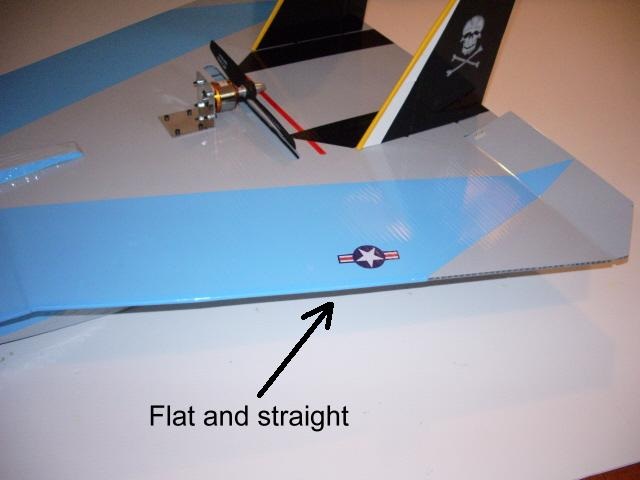
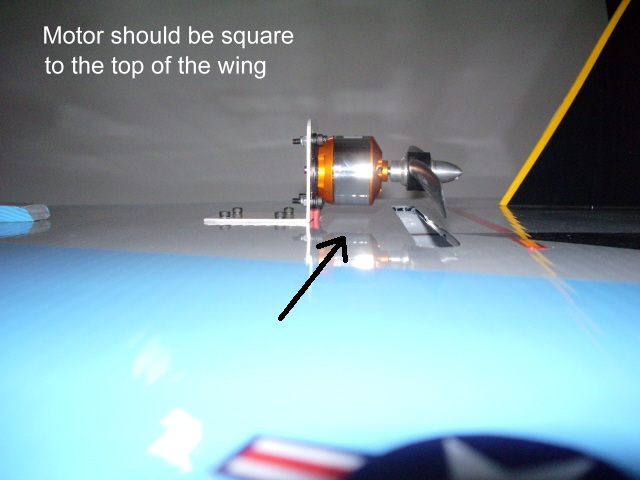
Go back to table of contents.
Center of gravity
Tip: Center of gravity.
Center of gravity: The center of gravity is approximately 11 1/4 to 11 1/2 inches from the leading edge of the wing.
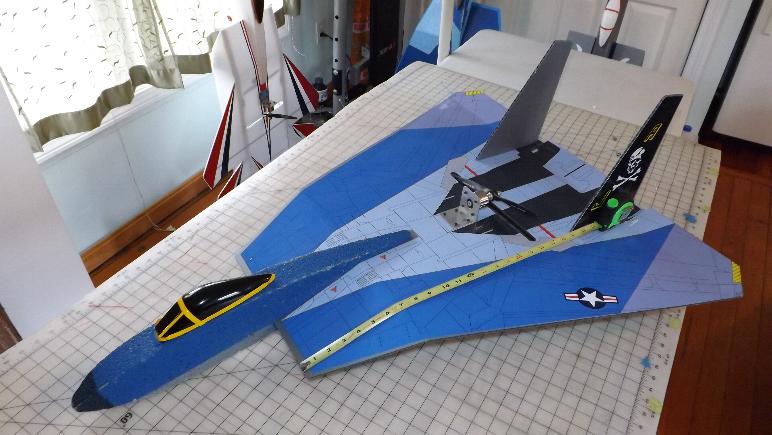
Go back to table of contents.